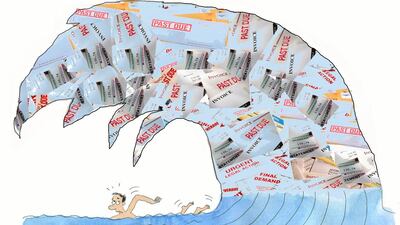“I’m being evicted. The police have given me 48 hours to leave my home ... I have a three-month-old baby girl, I have been offered a job but my new employer can’t process my residency visa because there are legal cases against me. I am banned from travelling, and I am being threatened with prison. I don’t know what to do.”
That pretty much sums up the telephone conversation I had with someone I met only once when he seemed to be thriving in a great job a few years ago. It is safe to say that the intervening years have not been kind. To sum it up: this person is in debt – bad news. He has been offered a job – good news. But his new employer cannot process his residency visa because of the debt. This means that he cannot work to pay off his debt, which means more debt will build up. All of that means he could go to prison, where it will be impossible for him to pay off the money owed. Talk about the mother of all Catch 22s.
Let’s call him BB for Broke Bloke. BB is clever, wants to provide for his family, and is stressed to the hilt. His big mistake was to live today on tomorrow’s money. In his case he wasn’t splashing the cash on designer gear and cars – he was building a life with a new wife. It is a tale that has all the hallmarks of every other person’s life.
It starts with the fallout from the credit crunch – six months into his marriage, BB lost his job in one GCC country and, having secured another post, moved to the UAE. That meant paying a year’s rent up front for a new home and the odd stick of furniture. Total loan: Dh105,000. Next a family member was ill. More debt was taken on to deal with it as cash gets the best medical care where he comes from – health insurance still has not taken off.
He gets the money by taking out a credit card that allows him to withdraw 90 per cent of the limit – the interest payable is the same as that for a personal loan. Dh95,000 is withdrawn, Dh148,000 is to be paid back to date. No problem – BB duly kept up the payments. But through no fault of his own, he lost his job. There were no opportunities back home as his nation has massive unemployment rates that were the catalyst for the Arab Spring. It took him 11 months to get another job, during which time he freelanced, but started falling behind with some payments.
Faced with threats and what I can only call thuggery from collection agents, he got his hands on another credit card to access cash to pay off some debt. That was another Dh100,000 that went straight out – meaning the debt on that card alone had now ballooned to Dh210,000 with interest. The tale is all too familiar for millions.
He landed a job just under a year later, renegotiated payment plans with the banks, but then lightning struck once more. Four months in there was a department reshuffle and he, along with 11 others, lost their jobs.
That was nine months ago and now BB is homeless and stuck. It is all too easy to wag the finger and say live within your means. But the way things are structured here means that we have no choice but to live on tomorrow’s money when starting out our lives in the UAE.
The truth is that many people are living on the edge regarding money, and when you are faced with jail, getting your hands on money in this way may seem to be all that can be done to save you.
I cannot imagine what BB must be going through to resort to reaching out to someone he met just the one time, in a very polished work setting where image is paramount.
He is not alone. These days, more people are e-mailing me with similar tales.
What I cannot do is fix people’s problems.
What I can do is share information and stories with the hope that some good will come of it.
A year ago, a survey indicated that 77 per cent of those questioned had debt.
My guess is that, come September and the holiday season ending with the giant thud of credit card bills to be paid, I will be getting a lot more emails from the likes of BB.
When he reached out to me, he needed to secure Dh25,000 to cover the bounced cheque his landlord received so that he didn’t go to jail. The only way out of this is to find a friend or friends who will lend him the money, or an employer who values his skills and is willing to pay his salary up front. It would mean that BB is still living today on tomorrow’s money but, hopefully, with a realistic plan to never ever be in this situation again.
I’d like to end with his words: “All I want to do is live a normal, decent life with my family. I could have left a long time ago, but as a believer in doing the right thing I chose to stay. Maybe not the wisest decision, but one I can live with ... for now.”
Nima Abu Wardeh is the founder of the personal finance website cashy.me. You can reach her at nima@cashy.me.

